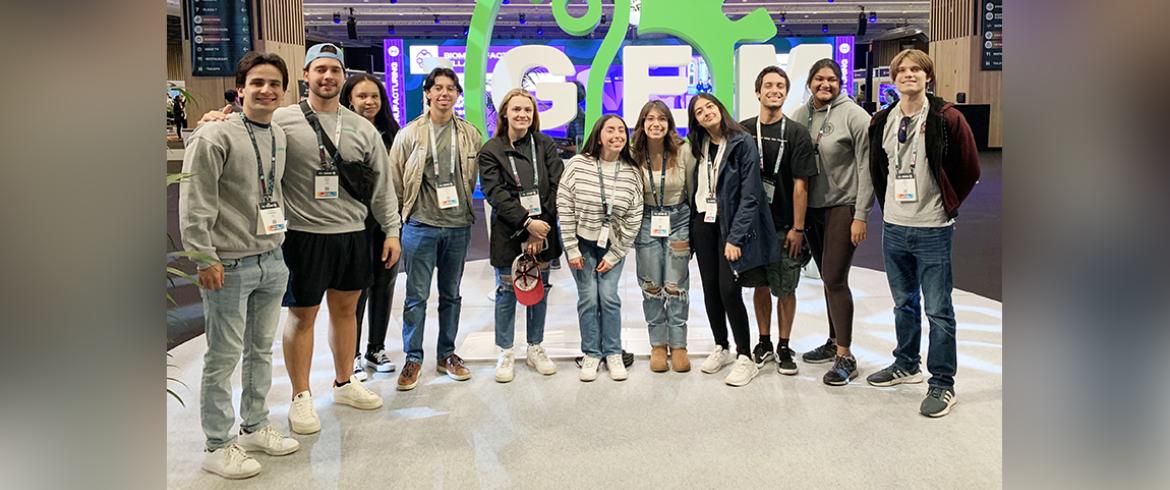
A team of 13 FSU undergraduate students won a silver medal for their work that may result in future treatment for patients living with the rare genetic disorder trimethylaminuria. (Photo courtesy of the iGEM Team)
FAMU-FSU Engineering students were part of a multidisciplinary team from Florida State University that won silver this year at the international 2023 iGEM Grand Jamboree in Paris.
The competition included over 400 teams worldwide who showcased their research and competed for awards. The event brought researchers, industry, startup founders, experts and others together to explore the future of synthetic biology.
Biomedical engineering students, Elizabeth Moore and Saiabhinav Devulapalli were the Team Leader and Associate Team Leader, respectively. Cesar Rodriguez, M.D., Research Faculty I and Entrepreneur in Residence in the Department of Biomedical Sciences in the FSU College of Medicine and David Montez, associate director of FSU’s Center for Undergraduate Research and Academic Engagement (CRE) were the principal investigators for the team.
The winning project investigated solutions for trimethylaminuria (TMAU), also known as fish odor syndrome. It’s a metabolic condition characterized by the body’s inability to oxidize trimethylamine (TMA) into odorless trimethylamine-n-oxide (TMAO). Individuals with the deficiency release a pungent fishy odor that can be embarrassing, impact their social relationships and affect their well-being.
As a solution, the team designed and built three biological devices with potential efficacy and is testing a probiotic made of engineered bacteria. Their research is illustrated in their presentation video and project.
“This year, we overcame the problem of assembling the DNA molecules used to engineer E. coli but had difficulty measuring the molecule that causes the odor (trimethylamine) in fish odor syndrome (trimethylaminuria),” Rodriguez said. “This likely kept us from the gold medal this year. The FSU iGEM teams remain the most successful in Florida and among the best in the country.”
“Since 2017, the FSU iGEM teams have earned one bronze, four silver and one gold medal. FSU still has the only gold medal in Florida,” Rodriguez said. “Most importantly, the FSU iGEM mission was accomplished, the students learned a lot, and had an unforgettable experience in Paris.”
There were 56 US teams, including 34 undergraduate teams. Twelve undergraduate teams from the U.S. achieved a silver medal, including FSU, Boston University, Duke, Harvard, University of California, San Diego, the Massachusetts Institute of Technology, Princeton, Stanford, University of Florida, University of Oregon, University of Washington and Yale.
“The project will continue in my lab thanks to financial support from the FSU Institute for Pediatric Rare Diseases,” Rodriguez said. “The emerging 2024 FSU iGEM team has agreed to continue the project so we’re bullish about the 2024 iGEM season.”
The iGEM Foundation is an independent, nonprofit organization dedicated to education and competition, advancing synthetic biology, and developing of an open community and collaboration.
Meet the 2023 FSU iGEM Team
Leadership Team
- Elizabeth Moore, Biomedical Engineering
- Sai Devulapalli, Biomedical Engineering
- Jolene Jones, STEM Entrepreneurship
- John Amos, Entrepreneurship
- Prerna Ravinder, Interdisciplinary Social Science Computer Programming and Application
Human Practices Team
- Christian Suastegui, Biomedical Engineering
- Colton Kelb, Exercise Physiology
Engineering Team
- Graeme Pugsley, Chemical Engineering,
- Eva Lobaton, Biochemistry,
- Sonali Shakya, Biological Science,
- Talia Valentine, Interdisciplinary Medical Sciences
- Hanna Yilmaz-Rodriguez, Biomedical Engineering
- Vicenzo DeVito, Applied Mathematics
Principal Investigators
- Cesar Rodriguez
- David Montez
RELATED ARTICLES
Engineering student part of silver multidisciplinary team at 2021 iGEM competition
Engineering undergraduates win gold at iGEM
Engineering students on iGem team head to genetically-engineered machine competition
